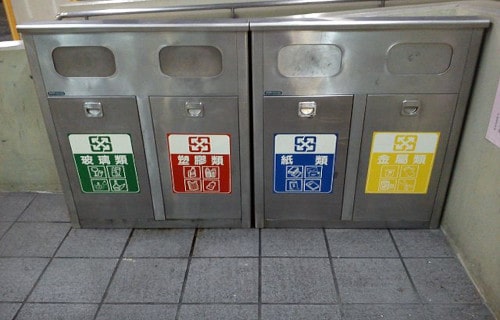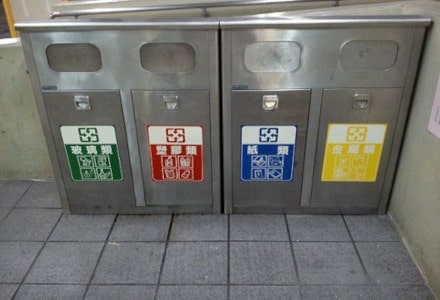
Photo: 蒼空 翔
CCL: https://bit.ly/3EXx6LU
Have you even thought of plastic recycling in Taiwan? For me, this is brand new. Recycling is a tricky story, even more so when it comes to practices in Asia.
Plastic lasts forever. As much as we know that products from recycled plastics are not recyclable anymore, a lot of us put high hopes in the recycling industry. To an extent we are right as recycling by default is undeniably good. It is, however, not often that we see solid ideas behind plastic recycling or the process on a large scale.
Sure, plastic polymers require greater processing than many other materials. The common practices are:
- monomer recycling,
- thermal depolymerisation,
- heat compression, etc.
Bear in mind also that different plastics can often not be recycled at all due to the difference in molecular structures (weight) and melt temperature.
In short, plastics are relatively nasty products that contaminate the environment heavily – throughout their life-cycle – which is forever.
Plastic Recycling in Taiwan – one of Asia’s Success Stories
Hope always dies last and we want to hear the good news also. There is a case of plastic recycling in Taiwan, which turns the recyclate into literally green gold. How do they do it?
Undeniably, Taiwan is a beautiful green island in a continent with a contradictory and often problematic background regarding sustainable practices.
From fake hair to football jerseys and building bricks, plastic recycling in Taiwan potentially means breathing new life into its massive plastic waste. It also means creating a booming new business at the same time as it aims to go green.
The island started recycling plastic more than a decade ago amid growing environmental concerns, and today it boasts about 73 percent recycling rates, according to the cabinet’s Environmental Protection Administration.
Each year, the administration collects hundreds of thousands tonnes of used plastic. It then turns into raw materials worth billions Taiwan dollars. That, of course, cuts down garbage disposal costs and carbon dioxide emissions as well.
“Plastic recycling in Taiwan can produce many products such as garments, flower pots, wigs and zippers,” said Ma Nien-ho, a spokesman for the administration’s recycling fund management board. “We are not only protecting the environment but also making money,” he said.
Taiwan took pride in the so-called “eco-fabric” that local companies used to make the jerseys for nine teams competing in the football World Cup in South Africa.
Each jersey was from eight plastic bottles melted and processed into polyester, is 13 percent lighter than traditional fabric. It could absorb and disperse sweat more quickly, according to Taiwan Textile Research Institute.
Super Textiles
“The production process is also more environmentally friendly as it takes less water and energy to dye the shirts when using colored bottles,” said Alex Lo, managing director of Super Textile Corporation.
Super Textile, a leading Taiwanese maker of eco-fabric, started exporting to the United States and Japan in recent years,. That gave a boost of up to 10 percent to its business, Lo said. “The response has been much warmer in the past years due to rising awareness on global warming and fluctuating cotton prices,” Lo said.
Taiwan, a small island that consumes about 4.5 billion plastic bottles annually, perhaps has an advantage in manufacturing eco-textiles through lower transportation and recycling costs. Tzu Chi Foundation, one of the island’s largest charity groups, runs over 4,500 recycling stations across Taiwan with the help of more than 70,000 volunteers who collect thousands of waste every year.
The foundation has distributed hundreds of thousands of blankets made from plastic bottles for relief uses at home and abroad.
Polli Bricks
Perhaps in the near future houses from recycled plastic bottles will mushroom across the island. Especially after “Eco Ark”, the world’s first such building which opened in November 2010.
“Eco Ark” is a three-level 24-metre (78-feet) high exhibition hall which debuted at the Taipei International Flora Exposition. It is built from 1.5 million recycled plastic bottles and cost 300 million Taiwan dollars.
“Through processing the bottles make bricks that can resist earthquakes, wind and fire while providing the building with natural lighting to save electricity,” said its architect Arthur Huang. “The ‘polli-bricks’ are also less expensive than conventional materials like wood and glass so the construction cost is much lower.”
Huang said his firm has built a luxury boutique hotel and several factories and corporate buildings with the bricks. “Just imagine if we can replace all the steel roofs in the buildings in Taipei with light transparent polli-bricks. That would make the city look more beautiful.”
With all of the above said, many countries could learn from plastic recycling in Taiwan and the green practices that make money as well.
This is the essence of sustainability – when all financial, environmental and communal benefits are met.
Credit: Excerpts from AFP
Check out our articles on Plastic Infographic – How to Reduce Plastic Usage, Tackling Electronic Waste, Greenwashing and Green Marketing, Plastic Bottles Recycling or Landfill

